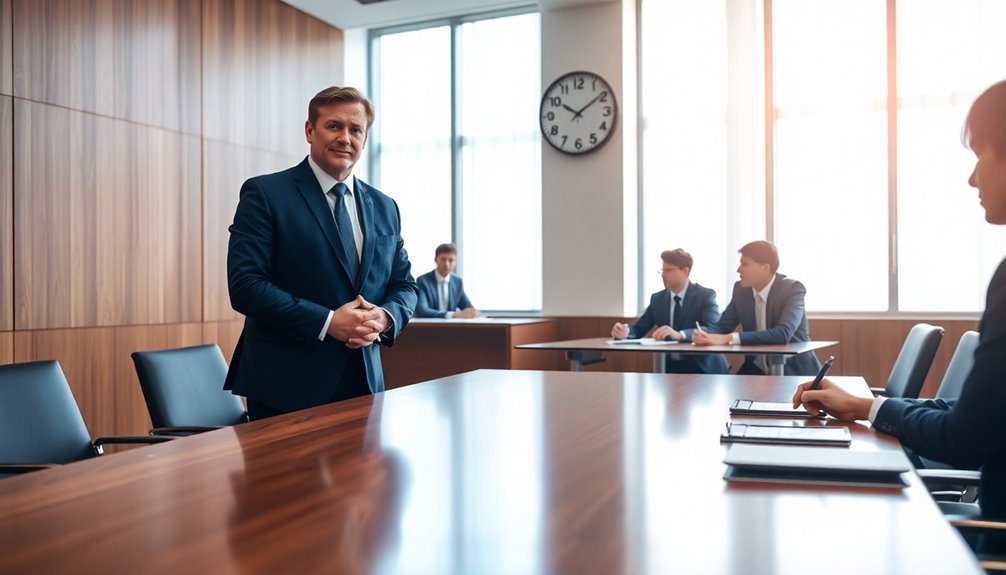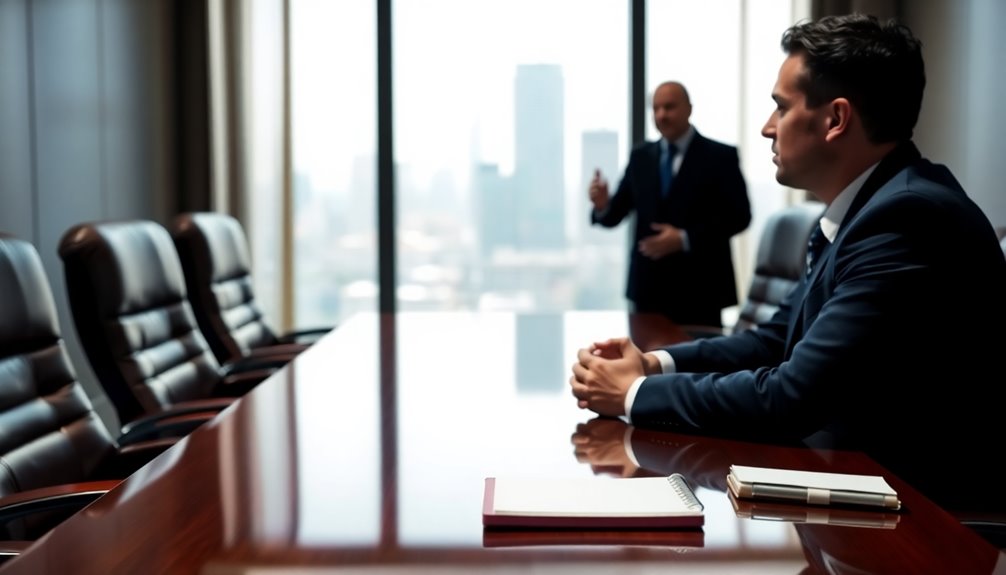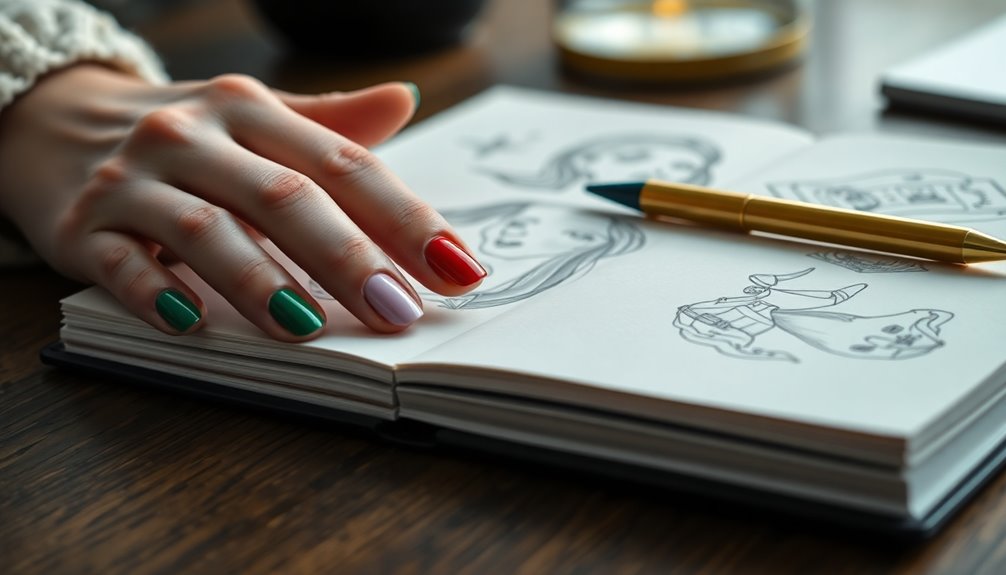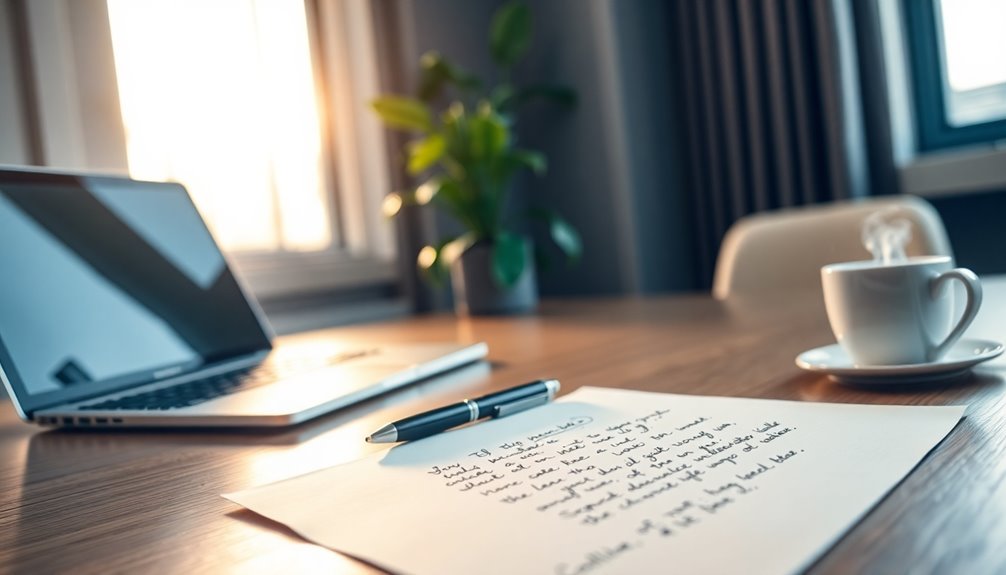Mastering thank-you letters for panel interviews is essential for standing out. Start with a professional greeting and express gratitude to each interviewer by name. Mention specific moments from your discussion, reinforcing your qualifications related to the position. Personalize your letter by connecting shared values or addressing advice given. Send your thank-you note within 24-48 hours to show enthusiasm. While email is efficient, consider a handwritten note for a personal touch. A well-crafted letter can influence decision-making, keeping you fresh in their minds. Stay tuned for more tips on perfecting your approach and enhancing your follow-up strategy.
Key Takeaways
- Address each panelist by name and express gratitude for their time and insights during the interview.
- Mention specific topics or projects discussed to personalize your letter and reinforce your connection.
- Reiterate your relevant qualifications and how they align with the company's needs and values.
- Clarify any points you feel were not fully addressed in the interview to strengthen your candidacy.
- Send your thank-you letter within 24-48 hours via email for promptness and efficiency.
Understanding Panel Interviews

Panel interviews can feel overwhelming, but understanding their structure can help you navigate them successfully. In these interviews, multiple interviewers assess your fit for a role simultaneously. Each panelist may focus on different aspects, such as technical skills, cultural fit, or problem-solving abilities.
Pay attention to how long the interview lasts; if it exceeds the scheduled time, it usually indicates interest in you. Engage in conversation rather than just answering questions; this illustrates your interpersonal skills.
Watch for positive body language from the interviewers, like nodding or smiling, as it signals their engagement. Finally, be prepared to discuss next steps; if they bring this up, it often means you're a strong candidate for advancement. Additionally, consider how your responses can reflect your ability to manage irregular income if the role involves freelance or contract work.
Importance of Thank-You Letters

Thank-you letters play an essential role in the post-interview process, as they not only express gratitude but also reinforce your candidacy in the minds of interviewers. By sending a thoughtful note, you show professionalism and a genuine interest in the position. This small gesture can set you apart from other candidates who may not follow up.
Moreover, a thank-you letter provides an opportunity to reiterate key points discussed during the interview, reminding interviewers of your qualifications and fit for the role.
Personalizing your letter by referencing specific conversations can strengthen your connection with the interviewers. Ultimately, a well-crafted thank-you letter can leave a lasting impression that influences their decision-making process.
Key Components of Effective Letters

Crafting an effective letter requires attention to several key components that can greatly enhance its impact.
Start with a professional greeting, addressing the interviewers by name. Express your gratitude clearly, mentioning specific moments from the interview that resonated with you. This shows you're engaged and attentive.
Next, briefly reiterate your qualifications, focusing on skills relevant to the position. If there were any points you didn't fully address during the interview, this is your chance to clarify them.
Conclude with a polite closing statement, thanking them once again for the opportunity and reaffirming your interest in the role.
Remember to proofread for any errors before sending the letter within 24-48 hours to maintain professionalism.
Personalization Techniques
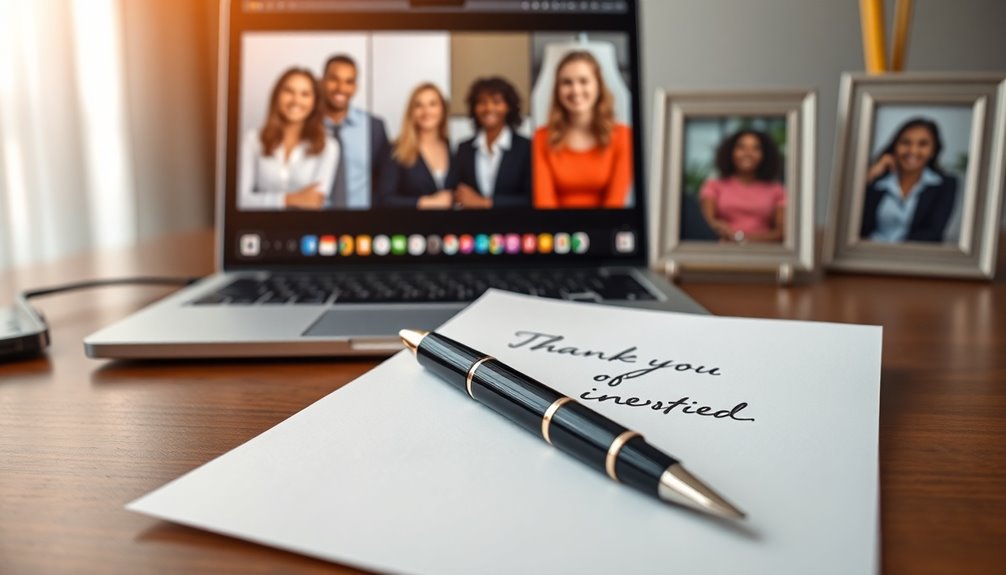
How can you make your thank-you letters stand out in a sea of generic responses? Personalization is key. Start by mentioning specific points discussed during the interview, reflecting on how those insights resonate with your experiences. Tailor your message for each interviewer, and connect their unique contributions to your qualifications. Below is a table to help identify personalization techniques:
| Technique | Example |
|---|---|
| Mention a project | "I appreciated your insights on Project X…" |
| Relate to values | "Your commitment to sustainability aligns with my passion for…" |
| Acknowledge advice | "Thank you for your advice on team collaboration; I plan to…" |
| Reference a personal story | "Your anecdote about Y inspired me to…" |
| Highlight team dynamics | "I loved hearing about the team's approach to problem-solving." |
Highlighting Your Qualifications

Highlighting your qualifications effectively in a thank-you letter can reinforce your fit for the role and keep you top of mind with the interviewers. Use this opportunity to remind them of your key skills and experiences that align with the job requirements.
Reference specific examples from the interview that showcase your abilities; this illustrates that you're not only engaged but also capable. If there were points you couldn't fully elaborate on during the interview, clarify those in your letter.
Keep your tone professional yet personable, ensuring that you express genuine enthusiasm for the role. By summarizing your qualifications succinctly, you remind them why you're the ideal candidate and leave a lasting impression.
Timing and Delivery Methods

Timing is essential when sending thank-you letters after a panel interview. Aim to send your letter within 24-48 hours to express your appreciation while the interview is still fresh in the interviewers' minds.
This promptness shows your enthusiasm for the position and keeps you top of mind.
As for delivery methods, email is often the quickest and most efficient option, especially in fast-paced environments. Make certain to use a clear subject line that reflects your appreciation.
If you prefer a more personal touch, consider sending a handwritten note; just make certain it arrives within the same timeframe.
Regardless of the method, be concise, professional, and tailored to each interviewer's contributions during the panel.
Additional Resources for Success

To boost your chances of success after a panel interview, tapping into additional resources can make a significant difference.
Here are three resources you should consider:
- Interview Etiquette Guides: Familiarize yourself with best practices for post-interview communication to guarantee you present yourself professionally.
- Post-Interview Note Templates: Use templates to structure your thank-you letters effectively, making it easier to convey your appreciation and reiterate your qualifications.
- Career Development Articles: Explore materials that focus on job application strategies and interview preparation, helping you refine your approach for future opportunities.
Utilizing these resources can enhance your follow-up efforts, strengthen your candidacy, and keep you informed about the best practices in the job market.
Frequently Asked Questions
Should I Send Individual Letters to Each Panel Member?
Yes, you should send individual letters to each panel member. This approach shows your appreciation for their unique contributions during the interview.
Personalizing each letter allows you to reference specific points discussed with each member, reinforcing your engagement and interest. It also helps you stand out, as it demonstrates your professionalism and thoughtfulness.
Aim to send these letters within 24-48 hours to maintain momentum and keep the conversation going.
What if I Forgot to Mention Something Important in the Interview?
If you forgot to mention something important in the interview, don't stress too much.
You can address it in your follow-up communication. In your thank-you letter, briefly highlight the point you missed and explain its significance. This shows your attentiveness and reinforces your qualifications.
Remember, it's normal for candidates to overlook details, and addressing it afterward demonstrates professionalism and genuine interest in the role.
Just be concise and positive!
Can I Include Links to My Portfolio in the Thank-You Letter?
Adding links to your portfolio in the thank-you letter can be a powerful way to showcase your skills.
By providing easy access, you enhance your chances of making a lasting impression.
Just make sure to mention why you believe your work aligns with what you discussed during the interview.
This thoughtful touch not only demonstrates your professionalism but also reinforces your enthusiasm for the role.
Keep it concise and clear!
How Do I Follow up if I Don't Receive a Response?
If you don't receive a response after your interview, wait about a week before following up.
Send a polite email expressing your continued interest in the position and ask for any updates. Keep it brief and professional, acknowledging their busy schedule.
You could say something like, "I hope all's well. I'm enthusiastic to hear about the next steps regarding my application."
This shows your enthusiasm without being pushy.
Is It Appropriate to Mention My Salary Expectations in the Thank-You Letter?
It's generally not appropriate to mention salary expectations in your thank-you letter.
This letter is meant to express gratitude and reinforce your interest in the role, not to negotiate terms. If salary discussions haven't happened yet, it's best to wait until they're initiated by the employer.
Focus on highlighting your qualifications and the positive aspects of the interview instead.
This approach strengthens your candidacy without complicating your follow-up communication.
Conclusion
To sum up, mastering thank-you letters for panel interviews is essential for standing out in a competitive job market. Did you know that candidates who send a thank-you note are 34% more likely to receive a job offer? By personalizing your message, highlighting your qualifications, and delivering it promptly, you reinforce your interest and professionalism. Don't miss this chance to make a lasting impression—your follow-up could be the key to your success!

